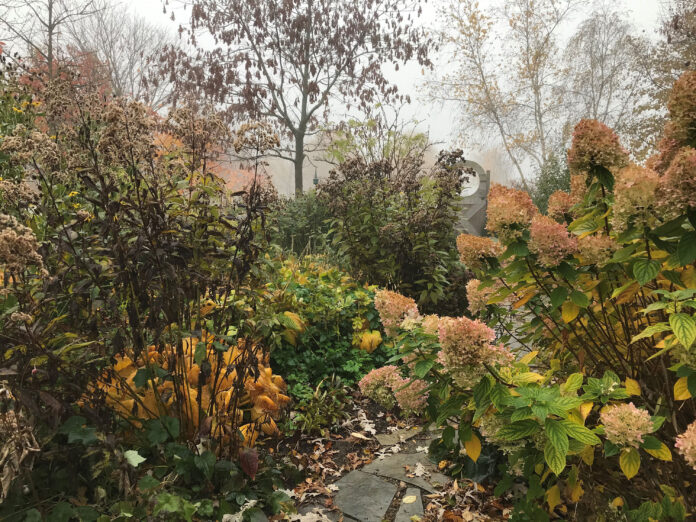
By Mark and Ben Cullen – Gardening
Canadians have much to look forward to in the next few months: hockey, the Grey Cup, warm fires, skiing, backyard hockey rinks. Gardeners get time off to consider their strategy for next season’s garden, but not until we have completed some important tasks.
Here is our short list of the most important gardening work as we begin to shut it down:
- Put away. You have an investment in a lot of stuff that does not age well when exposed to cold winter weather. Put under cover, that is, in the garage, shed or some place out of the weather: garden hose, watering cans, hand tools and anything that is made of wood. Wood rots fastest during the freeze/thaw cycles that the GTA is famous for. Wood window boxes and furniture should not contact soil, which hastens rot.
- Lawn mower. You will make the last cut soon if you have not already. We use our power mower set to its highest setting to mulch leaves on the lawn until they are too thick to leave there to rot (here, rot is beneficial) when we rake the excess off the grass into the garden. Then, we either empty the gas tank and change the oil of a power mower or put a stabilizer in it to keep it fresh come spring. Clean and oil the cutting deck.
- Lay sod. “The best performing sod we have laid is in November. Come spring, it bounces back and takes root.” Professional landscaper Simon Evans, Northscape Landscaping. A pro has spoken.
- Fertilize your lawn. This sounds odd, but the most important application of lawn fertilizer is right now, just before the snow flies and the deep freeze arrives. A fall application of lawn food strengthens the root zone for a fast and healthy green-up come spring.
- Leaves. Forgive us for repeating something that we have expounded upon for a few years, but do not put your leaves out to the curb. Instead, save work, expense, and money by raking leaves off your lawn onto your garden. Mulching with a power mower increases the volume of leaves that you can manage in this way. Or just pile them up in your compost bin. Either way, they will rot down by mid spring, attract all kinds of beneficial insects and make your garden plants very happy. Or you can rake them into large paper bags, drag them out to the curb to be picked up by a big diesel truck and buy soil or manure come spring. Do what makes the most sense for you.
- Plant tulips. Last call! Before heavy frost, tulips take well to our cold Canadian soil. Most other spring flowering bulbs less so, as they generally need more time to put down a root before winter.
What not to do:
- Do not cut back ornamental grasses and perennials. We leave ours standing all winter for two reasons. One, they produce some winter interest as the snow gently lands on them during winter months and two, many beneficial insects, soil borne mycorrhizae and beneficial bacteria benefit from the duff material that falls from trees, shrubs, and perennials in the fall. Avoid the temptation to sanitize your garden. That works well for your bathroom but not your yard.
- Do not trim your hydrangeas. It seems most everyone with a garden now has a bed these large, late-season, flowering beauties. Let them stand until April with the flowers intact. They are much more interesting than the bunch of sticks that form the skeleton of a pruned hydrangea.
- Do not prune maples, birch, or other hardwood trees while dormant. After the leaves fall, they tend to bleed when spring arrives if pruned in the dormant season, weakening them. Best to prune these trees when in full leaf.
Enjoy your winter not gardening. Come spring, you will be refreshed and ready to create the garden of your dreams.
Mark Cullen is an expert gardener, author, broadcaster, tree advocate and Member of the Order of Canada. His son Ben is a fourth-generation urban gardener and graduate of University of Guelph and Dalhousie University in Halifax. Follow them at markcullen.com, @markcullengardening, and on Facebook.

